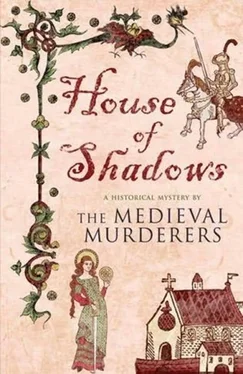Ignatius looked around him wildly, as if hoping the prior would appear to save him from this avenging angel, though de Wolfe looked more like a clovenhoofed acolyte at the moment.
‘My opinions about certain persons go no further than speculation and prayer, Crowner! I had no hand in her death. Why should I?’
De Wolfe recalled a situation in Exeter some months earlier and a phrase from the Scriptures came to his mind. ‘Does not the Vulgate say “thou shall not suffer a witch to live”?’ he snarled.
Ignatius paled and stuttered a reply: ‘The Book of Exodus does, yes – but I had no authority to intervene. I have detected a number of imps and devils and witches over the years, but it is not my place to banish them.’
A door opened across the passage and the prior’s voice called out for his secretary. John did not wish to expose Ignatius to any trouble, in case his protestations of innocence were true, and went out to speak to Robert Northam.
‘When your former guests return tonight, I need to speak to all of them as a matter of some urgency. I have been provided with a room in the cellarer’s building and would be grateful if you could ask them to attend upon me there.’
The prior nodded and motioned for John to enter his chamber, where the coroner had more questions. ‘I have heard rumours that not everyone was overjoyed at the prospect of this marriage. Have you any knowledge of this, prior?’
Northam sighed and tapped his fingers restlessly on his table. ‘You will no doubt find out when you talk to them, though it may take some prising from their lips,’ he said. ‘Firstly, Roger Beaumont has a daughter, Eleanor, by his first wife, now dead. She had set her cap at Jordan de Neville, and the king’s insistence on him marrying Christina was by no means welcome to her – nor I suspect to her father and stepmother.’
‘Because of the loss of their exploitation of the Glanville estates when Christina delivered them to her new husband?’ queried John.
‘That and the fact that, instead, Eleanor might have married into the Neville family, who are rising stars in the nobility, with extensive lands in the north.’
The prior seemed to have no more gossip about his guests, and John wondered where a senior man of the cloth had unearthed this titbit about Eleanor Beaumont. He suspected that his chaplain-secretary was the channel for such hearsay.
Leaving Robert Northam’s quarters, he went back to the warming room, as he wished to spend as little time as possible in the dank, inimical chamber above Christina’s corpse. He sat there for some time and eventually dozed off, joining two old monks who were snoring their way through the afternoon. The return of Gwyn and Thomas woke him up, and they thankfully warmed their icy feet and hands as they told him the meagre results of their spying mission.
Thomas had been consorting with a few monks and senior clerks in the church, cloister and infirmary, which he had visited with the excuse that he wished to compare the priory’s facilities with those at similar religious houses in Devon.
‘There is a general consensus that Brother Ignatius is slightly mad, as he sees goblins and imps possessing many of the people who enter the priory. But it seems a harmless obsession and gives rise more to pitying jibes than to any real concern,’ reported the clerk.
De Wolfe nodded agreement. ‘I have heard the same sort of comments about him. Doesn’t necessarily mean that he is harmless, though. Anything else?’
The little clerk rubbed his hands together to warm them. ‘I raised the subject of the wedding and the death. There were many sidelong glances and shrugs. I got the impression that this marriage was well known to be a sombre affair rather than the usual happy event.’
‘What did they say about it, then?’ demanded the coroner.
‘I gathered, more from their attitudes than outright words, that the people gathered here as guests made little secret of the fact that this was a union forced on them by King Richard. I could get no more detail than that, though a clerk in the scriptorium claimed that he had seen this Jordan fellow ogling the bridesmaid Margaret.’
Gwyn grunted confirmation of this. ‘The kitchen servants, where I went seeking some fresh bread and cheese, said much the same thing when I brought the conversation around to it. They have long noses and sharp eyes – they suggested that though Jordan fancied this Courtenay woman, it was Roger’s daughter who wanted him.’
De Wolfe pondered their words for a moment. ‘This is something I must pursue with these grand folk who are coming here tonight. Though why the bride should be killed to avoid a wedding is beyond me at the moment.’
Thomas rather hesitantly raised another matter. ‘Crowner, several of the brothers to whom I spoke muttered words about history repeating itself. I tried to worm more out of them, but they were very reluctant to answer. All I could gather was that there is some vague legend about the early years of this priory, when another king’s ward vanished.
‘I asked one of the oldest monks, Brother Martin, who is in charge of the scriptorium, but he said it was idle tittle-tattle. He claimed there was nothing in the priory archives to show that anyone had disappeared and blamed Ignatius for encouraging the belief that the place was haunted by the spirits of devils and incubi!’
‘God’s guts, what’s that got to do with a girl getting killed last week?’ objected Gwyn.
Thomas looked crestfallen, but John patted his shoulder. ‘Every bit of information may help, even if it only shows the mood of this place. I admit, it’s a cheerless house, even for a monastery!’
Just before nightfall, a small cavalcade arrived at the priory. There were two curtained litters slung between pairs of horses, accompanied by several well-dressed men on caparisoned steeds and half a dozen mounted servants, leading several packhorses. In addition, there were three women sitting side-saddle on palfreys. With much jingling of harness, they trooped through the outer gates and dismounted near the entrance to the inner courtyard. One older lady was helped down from the first litter and two younger ones climbed from the other.
The prior, his chaplain, Brother Ferdinand and several of the obidentiaries were there to receive them outside the door that led into the superior guest-rooms adjacent to the inner gatehouse, joining that to the cellarer’s building.
For the better part of an hour, there was much coming and going as the guests were installed in their various chambers, together with their personal body-servants and luggage. Eventually the main players assembled in the refectory for wine and refreshments, where Prior Robert told them of the coroner’s presence and his requirement that they attend upon him in turn in his makeshift office along the corridor in the cellarium. There was some indignant grumbling about being ordered around by some knight from some outlandish place called Devon, but Robert Northam firmly impressed on them that it was on the direct order of the Chief Justiciar, and hence the king himself.
After a flurry of messages conveyed by a couple of kitchen boys, some form of timetable was agreed and as darkness fell in the late-February afternoon John sat in his small room awaiting his first witness. He kept Thomas with him at a small table in the corner, supplied with pen, ink and parchment, ready to record anything of importance. Two three-branched candlesticks gave a fair light as Brother Ignatius shepherded in a large florid man in middle age.
‘Sir Roger Beaumont,’ announced the monk. ‘A noble baron of Wirksworth Castle in Derbyshire.’ He declaimed this as if he was herald at a coronation, as de Wolfe rose and courteously motioned the new arrival to the chair opposite his table. Roger grunted a reluctant greeting and sat down, revealing himself as a square-faced man with a high colour, his bushy grey eyebrows matching his bristly grey hair, which was shaved up to a line level with his ears in the old Norman fashion. He was dressed in fine though soberhued clothes, a long brown tunic under a green surcoat, all covered with a fur-lined pelisse of heavy black wool.
Читать дальше












